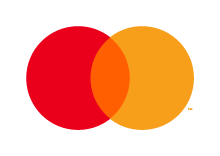Is it possible to eradicate extreme poverty? Here is the remarkable thing. For the first time in history, the answer is yes. Co-hosts Edie Lush and Claudia Romo Edelman talk about the new thinking about how to end the worst poverty. Macro solutions like growth, trade and migration still matter, a lot, they agree. But so do local solutions. Tanya Accone of Unicef explains how a failed effort to involve Silicon Valley in anti-poverty efforts produced a different approach in which solutions are developed with local communities not just for them. A good example from Uganda is Spouts of Water, which has invented clay pot filters that cost no more to use than the previous system of burning wood or coal to boil the water. Plus, Ugandans like the flavor! One of the basic lessons is that to help very poor people, often at the end of long dirt paths or isolated in slums, solutions must be designed for their situations, Accone explains. Context is crucial.
Edie and Claudia also discuss the meaning of two Nobel prizes that connect directly to eradicating poverty – the prize in economics for the new field of research-based solutions and the peace prize to Abiy Ahmed, Prime Minister of Ethiopia, for his efforts to create stability in the Horn of Africa, one of the world’s poorest regions.
Ending extreme poverty is the first of the U.N.’s 17 Sustainable Development Goals.
Edie points out that the idea we can even talk about ending poverty as a serious goal captures how far the world has come. Both proportionally and numerically, the number of poor people has been shrinking for decades. Much of this has been the result of broad economic growth, particularly in China.
But that’s left us with some of the most difficult situations, for example in rural India and sub-Saharan Africa. It will require sustained effort on multiple fronts to address these areas.
Facts and Actions are offered in this episode by Saskia Bruysten, co-founder of Yunus Social Business, which invests in sustainable businesses such as Spouts of Water.
Ann Cairns, Executive Vice Chairman of our sponsor, Mastercard, describes their Hundred Million Meals program to keep children in school by making sure they are fed. The effort is run jointly with the World Food Program, a Global GoalsCast partner.
Featured guests
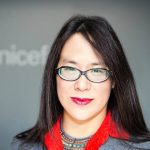
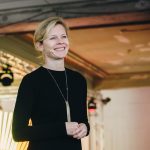


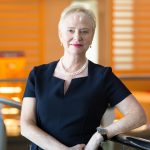
Transcript
Helene Dufour: 00:00 Our goal is to make sure that the fight against poverty is based on scientific evidence. Extract from the idea that often the poor are reduced to caricature and often even people who tried to help them do not actually understand what are the deep root of the problems that are addressing the poor.
Tanya Accone: 00:21 People that had expert knowledge on business modeling on, you know, the actual filtration techniques but completely not matched to the context that we were asking them to solve for
Pause: 00:36 [background music]
Tanya Accone: 00:36 In innovation, we often say that technology is just 10%, but 90% is about people and so really having that people focus and focus on designing with, not for those communities is sort of a fundamental way that we have learned to work.
Daniel Yin: 00:54 The cofounders and the management team really reached out to the community and to see what they prefer in their water. After doing about three years of R and D, we realized that ceramic water filters was the solution we wanted to provide to the Ugandan population.
Claudia Edelman: 01:18 Welcome to the Global GoalsCast!
Edie Lush: 01:20 The podcast that explores how to change the world.
Claudia Edelman: 01:23 In this episode, the latest on global goal 1: eradicating extreme poverty. The fact that we can even have this conversation, Edie, reflects one of the greatest achievements of human history. The number of profoundly poor people in the world has been declining fo half a century! We’re that close!
Edie Lush: 01:43 But getting it close isn’t getting it done. Traveling this last mile may well be the hardest. It’s gonna take a new kind of thinking to end poverty and it will require the inclusion of poor people themselves in that thinking and in the doing. We’re going to tell you all about that right after this.
Presenter: 02:04 This episode of Global GoalsCast is brought to you by Mastercard. Mastercard is dedicated to building an inclusive world in which the digital economy works for everyone, everywhere.
Ann Cairns: 02:16 The world really wasn’t designed with girls in mind, and education is one of those things where there has been an imbalance between the number of boys and girls going to school. Later in this episode, y’all hear about Mastercard’s 100 Million Meal Challenge, keeping kids in school by making sure they are fed. Thanks also to CBS News Digital and to Harman, the official sound of Global GoalsCast.
Claudia Edelman: 02:46 Welcome back. I’m Claudia Romo Edelman.
Edie Lush: 02:48 and I’m Edie Lush. Jesus said it, “The poor you will always have with you”.
Claudia Edelman: 02:53 Or as Moses put it, “There will always be poor in the land”.
Edie Lush: 02:57 But what if they were wrong? What if we could eradicate poverty or at least the very worst poverty?
Claudia Edelman: 03:04 Well, I was there, in 2015, when the United Nations said that it could be done! And the point was made dramatically. Ending extreme poverty was made the very first of the 17 sustainable development goals, and my former boss Ban Ki-Moon, who was Secretary General summed up the history when he said,
Ban Ki-Moon: 03:23 We are the first generation that can put an end to poverty.
Edie Lush: 03:31 It’s such a big ambition. I’m not sure we really grasp it. And Claudia, at the risk of taking the religious references too far, I went to the Bible of the Global Goalscast. My copy of Hans Rosling’s book, Factfullness. In 1800, almost everyone about 85 and a 100 people lived in what today we would call extreme poverty on less than the equivalent of $2 a day. But those numbers have improved, dramatically, and more or less steadily. In the 1960s, we passed a milestone, where less than half the people in the world lived in extreme poverty.
Claudia Edelman: 04:07 And today, only about 9% live below that extreme poverty line. So, the progress is amazing. And nevertheless, 9% is still about 700 million people. And those are the people who we’ll be talking about today, because we need to understand deeply what it will take to end extreme poverty now, that it has become the exception rather than the rule of human life.
Edie Lush: 04:36 Exactly. This is a very exciting moment. In fact, the Nobel committee’s awarded not one, but two Nobel Prizes this year for work that leads directly to ending poverty.
Claudia Edelman: 04:46 And we will talk later about those prizes in economics and the Nobel peace prize. But the big message was simple. Ending global poverty requires facts on the ground, on locally tailored actions and we have to take them now.
Edie Lush: 05:00 And to take a close look at these ideas. We found a guide at our beloved partner, UNICEF, a woman like you who really gets it.
New Speaker: 05:11 My name is Tanya Accone and I’m UNICEF’s Senior Advisor on Innovation at Scale.
Claudia Edelman: 05:17 There are two things about Tanya that make her a knowledgeable guide, I would say. First, is the way she grew up in South Africa…
Tanya Accone: 05:24 As someone who started off life in quite an impoverished kind of contexts themselves, I can sort of see that connections of everything to kind of Goal 1, because so many decisions that are really difficult for families and young people in communities to make have an underlying economic disadvantage as a major driver.
Claudia Edelman: 05:42 And then, second, there was how one of her early efforts to combat poverty ended up in a heartache and frustration. The big brains of Silicon Valley couldn’t grasp how different life is when you live on $1.90 a day. Well from that failure emerged, a new way of thinking about how to end poverty, as she told us…
Tanya Accone: 06:08 A number of years back, we were looking at innovation as an opportunity to do something different that really accelerates and exponentially improves our results and the capability to deliver more to children in their communities around the world with less ideally. And so we thought a place where that’s just a hotbed of great ideas and disruptive thinking is Silicon Valley and we want to disrupt development in order to do better. So what better place could there be than to sit ourselves down with some of the Valley’s, most cutting edge thinkers and think through these problems? We’re really interested in a couple of different challenges. So one of them is in the area of water and sanitation, and this is really key for UNICEF because in the development sector it’s one area that we are responsible for no matter where, no matter when. And we wanted to get ideas from people around how would you solve this massive challenge? Which is essentially also a massive market opportunity of getting clean water to people no matter where they are. And it could have been anything from water quality monitoring to monitoring with a water points or are working or not. So it could have been a mobile app, it could be geospatial solutions, it could be really practical filtering type things. The door was open.
Edie Lush: 07:28 And so what were the solutions that these folks in Silicon Valley had?
Tanya Accone: 07:33 If there were two characteristics that they had in common, it was one overwhelmingly just could not imagine the kind of context that we’re talking about. Even though, you know, we unpacked, here’s the persona that you’re solving for, this is what they earn. They earn, you know, a $1.90 a day, suggesting that someone is going to go to the local council office or something like that. That doesn’t work because the cost of that action, which seems like nothing in a industrialized country, is, is a massive cost. And I think the other piece that they couldn’t really conceive of was just what does living on a $1.90 actually mean? Cause I mean we all should know how much money that is, but I think it was just unimaginable. So to unpack, say a couple of the solutions that came out, particularly around water purification, we had a group that came up with a solution for a very high quality water filtration system that was intended to go to villages, but it was sort of the size of a container. So to get it anywhere it had to go on kind of a flatbed truck. And when you’re talking about last mile delivery, meaning that last mile, or in most cases, that last many miles, are winding pathways, their foot paths, and some cases, you’re going by donkey are going by, you know, foot, you’re going by bicycle if you’re enough to have one. So you’re certainly cannot be tracking something on the back of a flatbed truck. And there was another idea around how a version of that could be used in emergencies, which is another area that UNICEF is, you know, very involved in and of course has to deliver clean water in those situations. But the solution there was around being able to fly these in on helicopter. So flying in something by a helicopter is an incredible expense and that just doesn’t kind of compute when you’re talking about the costs, the accessibility, etc.
Tanya Accone: 09:28 And then when I looked at examples that people had for ideas for households, so not at the whole village, but let’s see, what could we provide each household to use in terms of getting safe water. And there are already a number of, of approaches that people use. So they use chlorine straining. I mean there were a lot of just very simple techniques that are currently in use. But instead what we got was a whole business plan that was sort of for a filter system as similar, but it was not. But some of that in concept to, a Britta filter, or a pure water filter and the business plan was that, you know, we’d give the jug and three filters away for free and then we were going to make money off selling the filters. And again, that had had no relationship to how much money people have, what they were going to be able to afford, distribution of these things, you know, not understanding, you’re not talking about going to the supermarket to buy a filter. This is not the reality that people are living in. And then of course, worst of all, not really thinking about the whole waste-stream. So after a month you’re finished with this filter. What exactly is happening to it? So I think there was just this fundamental mismatch. So people that had expert knowledge on business modeling, the actual filtration techniques, but completely not matched to the context that we were asking them to solve for.
Edie Lush: 10:52 What did you do next? You went to Africa in places where people were living in the lowest quintile and asked them to help you design. Is that right?
Tanya Accone: 11:02 That’s right. And we’ve kind of built on that where we have very much a human-centered design or design thinking based practice because with, you know, that’s really an important way of being able to level the playing field of ideas and needs, in a context where you’re pulling together many stakeholders. So it’s really important to, especially where you have representatives of those marginal communities that they feel as empowered and as equal to others that you’re going to bring into that same room. And what we found is by looking at and with communities and guiding was facilitating a process around them, exploring what their greatest challenges are, you can come up with much more relevant solutions that are immediately informed by the context. And what we’ve done is added to that the sort of the expertise of Silicon Valley but not in terms of you design the solution, but in terms of help us think through ways to, you know, strengthen this. And those are the things that have actually scaled most effectively to more places serving in some cases 180 million people today, some of them in 60 countries. So really powerful. And I think in innovation, we often say, that technology is just 10% but 90% is about people. And so really having that people focus and focus on designing with, not for, those communities is sort of a fundamental way that we have learned to work.
Claudia Edelman: 12:35 When we come back, we will check out how the signing with a community in Uganda produced a clean water solution that worked.
Edie Lush: 12:42 But first, here’s Ann Cairns from our sponsor at Mastercard to tell us about a program Mastercard supported to keep kids in school.
Ann Cairns: 12:51 The world really wasn’t designed with girls in mind. It’s been designed in a way that don’t really meet the lives of women and women as they’re growing up. And education is one of those things where there has been an imbalance between the number of boys and girls going to school. And what we’ve seen is that if schools are open and parents know that their children can be fed, then they’ll send both their boys and their girls to school. In Mali, there were recent funding challenges that forced 40% of the World Food Programme canteens to close down. And the interesting thing here was that the regular attendance of the schools that were affected fell by 90% so this really gives you a feeling that those parents are sending their kids to school so that they can be fed. And now Mastercard is the top funder of the schools in Mali and we helped the World Food Programme reopen the canteens and actually expand to new locations. The student retention rate for the schools increased to 96% from an average of 63%, so it was really very impactful.
Edie Lush: 14:08 And tell me about this 100 Million Meal Challenge. Why did you choose 100 million?
Ann Cairns: 14:16 Here at MasterCard, we deal in billions of people and… so to us we wanted to target something which seemed a reasonable goal that was going to affect the lives of children all over the world. There are around 80 million people who are hungry every day on this planet. And so by aiming for a hundred million meals, we were effectively feeding the world for a day. The really good news is that we’ve actually exceeded our target earlier this year, which was very exciting. And I think it really motivated everyone around the world. Our employees, for sure, but also many of our customers.
Edie Lush: 15:00 That was Ann Cairns from our sponsor, Mastercard.
Claudia Edelman: 15:02 Mastercard! It’s really great to have their support for another season! They’re so great and they have great stories!
Edie Lush: 15:10 Right? I feel very supported.
Claudia Edelman: 15:12 Yeah, I feel the love!
Pause: 15:17 [background music]
Claudia Edelman: 15:17 So before the break we heard Tanya Accone describe how projects designed from Silicon Valley did not work for really poor people because they designed for the community, but not with them. But we found one of our partners that was doing things with the community.
Edie Lush: 15:33 Yes, Yunus Social Business. They invest in local businesses that help to improve living conditions. One of those businesses that they invested in is called Spouts of Water. And Spouts of Water solved the very problem of clean water. They had confounded all of those folks in Silicon Valley. I spoke to Daniel Yin, the CEO.
Pause: 15:52 [background music]
Edie Lush: 15:55 So tell me about SPOUTS and tell me about the technology that it has produced. It looks like a flower pot, but it’s not. It’s a filter. How does it work?
Daniel Yin: 16:06 Embedded within this filter, there are microscopic pores that remove all of the bacteria and protozoa from the water. So if you pour in any type of water, no matter how turbid it is, only clean water goes through and all of the germs and bacteria are removed.
Edie Lush: 16:24 How did the founders of SPOUTS come up with the design? I’m interested in how they worked with the community to do that.
Daniel Yin: 16:32 The whole design process was a collective effort all the way from our founders and our management team to the customers. The co-founders came in 2012 and they had the R and D process for about three years. So in these three years, the co-founders and the management team really reached out to the community and to see what they prefer in their water. What we found out is that a lot of families in the village, once they treat their water by boiling it or through chlorination tablets, they store the water in clay pots, giving it that distinct clay tastes, which a lot of families are accustomed to. So after doing about three years of R and D, we realized that ceramic water filters was the solution we wanted it to provide to the Ugandan population.
Edie Lush: 17:22 They use two types of surplus clay, yellow and black, which they buy from local farmers. Paul Matovu who runs SPOUTS, NGO side of the business knows firsthand the negative impact that dirty drinking water can have.
Paul Matovu: 17:36 More than 46% of Ugandans, actually, boil their water using the firewood or charcoal and they spend a lot of money. But also I was working with schools at that time before they joined. So there were lots waterborne disease cases in schools, because the schools don’t have the money to prepare drinking water for the kids. So when kids fall sick, they cannot attend school due to illness. So there are very, very many factors, but mostly to me it was mostly about the environmental, bit of it, reduction in carbon emissions, but also the social aspect of people not having to fall sick, people not having to spend on preventable waterborne diseases.
Edie Lush: 18:17 I asked Daniel how much these filters cost.
Daniel Yin: 18:21 Our filter costs around $24 and because we’re the only local manufacturer here in Uganda, we’re able to provide the filter at less than one third of the other imported water filters sold here. To make this even more affordable to the population here in Uganda, we offer a financing plan as well. So and that requires, you know, just a $7 down payment with the weekly payment of one and a half dollars. With this financing plan we’re able to reach even the base of the pyramid customers.
Paul Matovu: 18:54 You know, most people know buy firewood and charcoal to boil their water. And so our impact reports actually show that households save a lot of money by using our, our product.
Edie Lush: 19:07 The weekly cost of the Spout System is no more than and is often less than the cost of fuel to boil the water, which is what people were doing before.
Pause: 19:19 [background music]
Paul Matovu: 19:19 We installed water filters on islands and other rural communities. Last year alone, we stored over 30,000 filters in more than 4,000 households. One of our pilot programs was on the island called Bavooma Island. It’s on Lake Victoria, where people were suffering from biohazia and there were also many cases of diarrhea and typhoid. So we partnered with RTI, which is an international organization that has an office here in Uganda, and we found that after our intervention, the kids attendance in class increased by over 36%. This was attributed to the fact that, uh, about 98% of the students who are now taking water from our filter. And so, uh, beyond just the statistics there is this particular lady, I remember the name, she’s called Joy, she’s over 80 years old and she has more than five grandchildren. And prior to our intervention she had reported very many cases of diarrhea and typhoid. But then after one year of using our product, she reported that uh, high expenditure on waterborne diseases had reduced drastically and also she didn’t have to spend money to treat her kids, her grandchildren for typhoid, diarrhea, and other waterborne related diseases.
Edie Lush: 20:44 How much money did they save?
Paul Matovu: 20:46 So on average households spend between $1.60 US dollars actually to $3 dollars per week just spent on boiling.
Edie Lush: 20:55 How do you think this filter helps to overcome extreme poverty?
Paul Matovu: 21:01 Wow. Um, when I think about poverty and how it affects our communities. It’s not just about people not having the money, but it’s also about people having to unnecessarily spend the little money they have on treating preventative waterborne diseases. So our product has helped people. One to not spend money on boiling, but also not to spend money on treating what have one diseases like diarrhea and typhoid. We have some cases where people spend more than $50 just treating typhoid. These are very, very underserved and impoverished communities. So I’m convinced that people are saving a lot of money in different ways. The other bit is that time is money. So when people saving more of their time, they can use the time to make more money. We found that it’s mostly women and the girl children who do the preparation of drinking water and so on. The side of the ladies where they use this time for is to go and participate in more economic activities. I would say like farming or crafting stuff that they can sell in the market. On the side of the kids, they use the time to read their books.
Claudia Edelman: 22:17 Once again, this captures how making progress in one area can lead to making progress in another. So progress on clean water leads to progress on keeping kids in school. Plus, less water boiled means less carbon used and you get the idea.
Edie Lush: 22:34 It’s like a virtuous circle. Like the SDGs. In fact, I asked Tanya at UNICEF whether innovation done within the right context is enough on its own to eradicate extreme poverty.
Tanya Accone: 22:47 No, it is not. Um, I think another couple of lessons that we have learned, um, but I think we’ve always have known that from the start is um, and it’s uh, it’s often said to be an African proverb, but as an African I tell you, I’m not sure that it is an African proverb, but you know, if you want to go fast, go alone. If you want to go far, go together. We’ve learned we need to go together. And that means being very rooted and making sure that you have experts in the context that you are designing with and for there together with strong partnerships from the best minds, you know in Silicon Valley, I’m using that as a, as a proxy for the private sector, for other kinds of public sector innovation and those parts of the ecosystem are incredibly, incredibly important. So you really need to be involving the entire ecosystem because you know the kinds of of challenges that we all are looking at triumphing over together in terms of the SDGs and you know, poverty reduction just being one but an incredibly important one. We can’t do that in a piecemeal way. So connecting, catalyzing and really collaborating is essential. We welcome people to reach out to us and explore how could we work together on something that would actually help to change the trajectory in a positive way of reaching the SDGs.
Claudia Edelman: 24:10 That’s our mantra, Edie, at the Global GoalsCast! It is all connected! We can only make it together! We only win when we all win!
Edie Lush: 24:21 Winner, winner chicken dinner. Speaking of which, there was big news this week about the Nobel Prizes.
Claudia Edelman: 24:28 I like the chicken connection to the Nobel Prizes, but I agree. Yes. There was this announcement from the chair of the Norwegian level committee, Berit Reiss-Andersen.
Berit Andersen: 24:39 As prime minister, Abyi Ahmed has sought to promote reconciliation, solidarity and social justice. The Norwegian Nobel committee hopes that the Nobel Prize will strengthen Prime Minister Abyi in his important work for peace and reconciliation. A peaceful, stable and successful Ethiopia will have many positive side effects.
Claudia Edelman: 25:09 This fits right into our conversation about Goal 1 and eradicating poverty. I remember our episode about conflict and hunger. Conflict is one of the prime sources of poverty and hunger, so eliminating conflict in the horn of Africa opens a road not only to peace but also to eradicating poverty.
Edie Lush: 25:29 And that region from the horn of Africa West across the Sahel along the Southern Sahara desert remains one of the poorest and most stripe torn regions in the world.
Claudia Edelman: 25:39 The Ethiopian economy is already one of the fastest growing economies in the world and that is reducing poverty. But 20% of the population, which is more than 20 million people, by the way, still live below the poverty line. Many still don’t have clean water and of course conflict and violence have been around them all the time. So to leave the Ethiopians and the rest of the region out of poverty, we need both: an end to conflict and the innovation of homegrown solutions that Tanya Accone describe to us.
Edie Lush: 26:10 In just a few days after the prize to prime minister Abyi, a second Nobel Prize was announced that goes right to the question of finding approaches that work.
P. Fredrickson: 26:20 So this year’s prize in economic sciences is about alleviating global poverty or how to reduce global poverty is a fundamental but also daunting question. Effective policy alleviation requires that we can answer these questions and the most credible way of answering them is to try particular interventions in field experiments. This experimental approach has completely reshaped research in development economics. The results have a clear impact on policy and keeps improving our ability to fight global poverty.
Edie Lush: 26:58 That was Peter Fredrickson, chair of the Economics Award Committee, one of the three winners. Helene Dufour is a professor at MIT and she described her work,
Helene Dufour: 27:09 Our goal is to make sure that the fight against poverty is based on scientific evidence. It starts from the idea that often the poor are reduced to caricature and often people who tried to help them do not actually understand what are the deep root the problems that are addressing the poor. Poor people are supposed to be either completely desperate or lazy, or entrepreneurial, but we don’t try to understand the deep root and interconnected root of poverty. So what we tried to do in our approaches to say, look, let’s try and unpack the problem one by one and address them as vigorously and scientifically as possible. And that’s how we developed and use the experimental approach to better understand what are the reasons for particular problems. For example, the learning crisis that Professor Fredrickson was talking about and what can be done about it, what works, what doesn’t work and why.
Edie Lush: 28:11 Professor Dufour pointed out that while international assistance can be helpful, particularly during natural disasters or pandemic disease outbreaks, most of the resources for ending poverty will come from individual countries themselves.
Claudia Edelman: 28:25 Which of course is why they must use those resources wisely and effectively.
Edie Lush: 28:29 Which is another way of saying what Tanya Accone was saying. That context is king and what Helene Dufour and her two economics colleagues are saying when they insist that the fight to end poverty be based on solid field research and not just good intentions.
Claudia Edelman: 28:44 What I like is there seems to be a real urgency, like momentum, traction in the announcements to awarding these prices now to send a message, not just to give an honor.
Edie Lush: 28:55 And the three economists are decades younger than the typical Nobel winners and prime minister Abyi has only been in office a year.
Claudia Edelman: 29:04 Yes, but it’s been quite a year! In his first year in office, Prime Minister Abyi ended the border conflict with Eritrea and worked to resolve all the regional conflicts which believe me are so deep and complicated. And he also took strong steps to open Ethiopia to economic and political change. He freed journalists from prison, welcomed dissidents back, and he has promised free elections next year. And Edie, we shouldn’t actually believe the honeymoon, but I am very optimistic about what’s happening these first year for Ethiopia.
Edie Lush: 29:36 Let’s not forget that he’s brought many more women into government as well.
Claudia Edelman: 29:40 Yes. As well as representatives of every religion, language and ethnic group, of which Ethiopia has many and that is a kind of inclusion that can sport innovations! And Ethiopia is so wonderful, so big on powerful, Edie!
Edie Lush: 29:57 I really want to go there and I think that we should go interview prime minister Abyi. What do you think he should invite us to come?
Claudia Edelman: 30:04 Prime Minister Abyi, if you’re listening to this episode, consider these an open, uh, space for you to send us an invitation for the Global GoalsCast with him in Ethiopia.
Edie Lush: 30:16 The Nobel committee made it clear they had chosen Prime Minister Abyi to inspire support for his goals as much as to honor what he’s achieved so far. And Professor Dufour accepted the award on behalf of what she called the movement for researched-based development policy.
Claudia Edelman: 30:33 There’s some sort of debate among some economists, Edie. Some point out that most of that extraordinary progress in ending poverty is simply the result of growth. As countries get richer, individuals become well at least less poor. So they argue that free markets, migration and trade will do the most to end poverty, not any other SDG policy.
Edie Lush: 30:57 It’s not either or, right? Ethiopia is one of the fastest growing economies in the world. Of course that helps, but without peace there would never be prosperity for everyone. How’s this going to turn out? Will these prices look prescient or premature? Can poverty really be eradicated in 10 years?
Claudia Edelman: 31:16 Well, we believe so. We absolutely… Were like on the optimistic team here. We’re on the possibilistic team here. If we would actually follow the SDGs and we accomplished the 17 goals and the 169 indicators, by the majority of the world, we will eradicate extreme poverty from the world completely! But what we cannot promise is that people will do it, that countries will follow it. What we can promise is to follow the fight to end poverty right through 2030 in future episodes of the Global GoalsCast.
Claudia Edelman: 31:54 Now for the section of this show where we give you the three facts that you can show off with your mother-in-law and the three actions to guide your to do list for today…
Edie Lush: 32:03 I actually do want to know is your mother-in-law impressed when you show off with the three facts?
Claudia Edelman: 32:12 [laughter] I do showoff with some facts. I tell you there’s no sexier thing than to have some data points to back up any evidence in there in the argument.
Edie Lush: 32:20 So you heard it here. Data is sexy! [laughter] Okay, so joining us for that welcome. Saskia Bruysten, co-founder and CEO, Yunus Social Business.
Saskia Bruysten: 32:33 The first fact is that there is some great progress happening. Extreme poverty has halved in the last two decades. That is fantastic news, but we need to keep in mind that moving out of this bracket still means to only live on $1.90 a day. If the world managed to cut this number by half, we should be able to reduce the amount of poverty to zero by 2030. My second fact is that last year, 26 individuals earned the same amount of money as 3.8 billion people who make up the poorest half of humanity. Despite the fact that extreme poverty has been going down, inequality has still been rising. Billionaires now have more wealth than ever before. While only 5% of all new income generated from the global growth trickles down to the poorest 60%. My third fact is that poverty can be addressed by business. This may not seem logical at first, but we actually really need business if we want to make big changes. You’ve heard earlier in the episode about Spouts of Water, which addresses one problem of poverty, the lack of access of clean drinking water through a social business approach. But there are many other social business companies around the world that address important issues like clean energy, health, education, or even just creating income or jobs for poor or the marginalized. I wanted to leave you with three concrete actions that you can take yourself. So number one, to find out more about practical social business solutions, to end extreme poverty, please read my co-founder, Mohammad Yunus’ book: “A World of Three Zeros”. Number two, make sure your own savings, however small they may be, are invested in socially and environmentally responsible fund. Ask your banker or consider investing yourself in a social business that actively makes a change in the world. Go to organizations like Kiva… or go to Yunus Social Business funds. Number three, start your own social business or get your organization involved. Pick a problem that you want to tackle yourself and that you’re passionate about and start a company that addresses it. Or if you work for a large corporation, reach out to your CEO or your department, or your innovation team and ask them to consider setting up a social business.
Claudia Edelman: 35:17 This was incredible. Thank you to our guests and thank you all for listening. Please, like and subscribe via iTunes or wherever you get your podcasts from.
Edie Lush: 35:28 And give us five stars. We love the stars!
Claudia Edelman: 35:30 And follow us on social media @Global GoalsCast and see you next time.
Edie Lush: 35:34 Adios. Have fun in San Francisco.
Claudia Edelman: 35:37 Bye!
Presenter: 35:42 Global GoalsCast was hosted by Edie Lush and Claudia Romo Edelman. We are editorial gurued by Mike Oreskes editing and sound production by Simon James. Our operations director is Michelle Cooprider. And welcome to our new intern, Tina Pastore. Music in this episode was by Neil Hale, Angelica Garcia, Simon James, Katie Crone, Ashish Paliwal, and Andrew Phillips. This episode of Global GoalsCast is brought to you by Mastercard, creating scalable solutions for sustainable and inclusive economic growth. Thanks, also, to CBS News Digital and to Harman, the official sound of Global GoalsCast.
